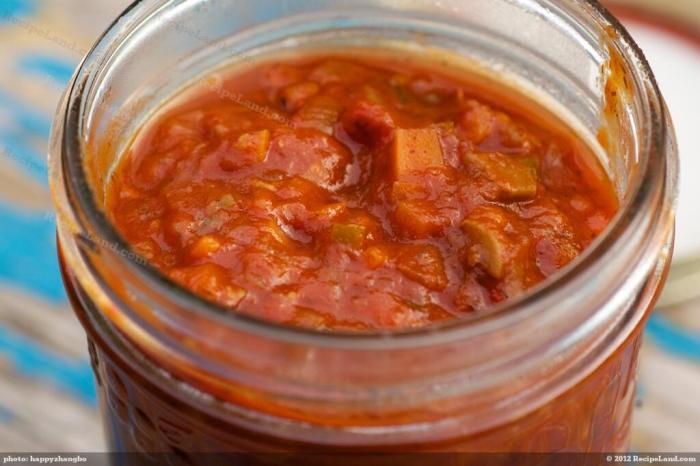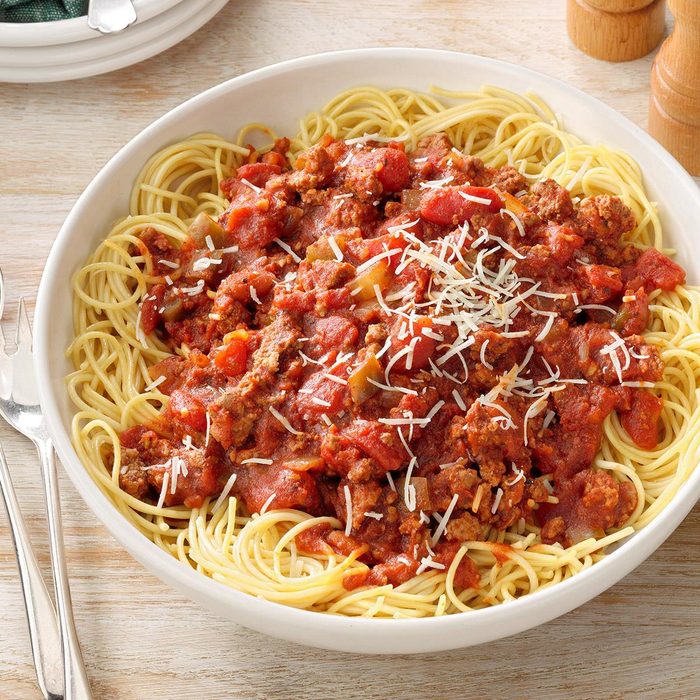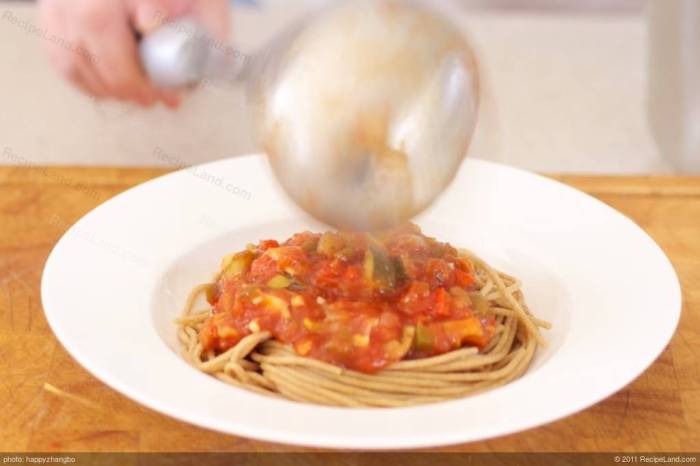Garden Spaghetti Sauce Recipe
Garden Spaghetti Sauce: A Taste of Summer: Garden Spaghetti Sauce Recipe

Source: recipeland.com
Garden spaghetti sauce recipe – Garden spaghetti sauce embodies the essence of summer, capturing the vibrant flavors of freshly harvested vegetables. Unlike store-bought versions, this sauce boasts a depth of flavor and unparalleled freshness, a testament to the quality of homegrown ingredients. The use of homegrown produce offers not only superior taste but also a connection to the land and a reduction in environmental impact.
This tradition of garden-fresh sauces dates back centuries, with variations found in countless cultures, each reflecting the unique bounty of their respective regions.
Ingredient Selection and Preparation, Garden spaghetti sauce recipe
The success of any garden spaghetti sauce hinges on the quality of its ingredients. Selecting the right tomatoes is paramount. Here’s a comparison of popular varieties:
| Variety | Flavor Profile | Acidity | Ideal Use |
|---|---|---|---|
| Roma | Rich, meaty | Medium | Sauce base |
| San Marzano | Sweet, slightly acidic | Low | Classic Italian sauces |
| Heirloom | Varied, often complex | Variable | Adds unique flavor notes |
| Cherry | Sweet, intensely flavored | Low to Medium | Adds sweetness and bursts of flavor |
Proper harvesting and preparation are equally crucial. Follow these steps for optimal results:
- Harvest tomatoes when fully ripe, exhibiting deep color and a slight give when gently squeezed.
- Remove stems and any blemishes from tomatoes.
- Finely chop onions and garlic for a more even distribution of flavor.
- Remove seeds and membranes from peppers, depending on desired heat level.
- Wash and chop fresh herbs, adding them towards the end of cooking to preserve their delicate flavors.
Using ripe, high-quality ingredients ensures a vibrant, flavorful sauce. Avoid using damaged or overripe produce.
Sauce Making Methods and Techniques

Source: findthoserecipes.com
Several methods can be employed to create a delicious garden spaghetti sauce. Each offers a unique texture and flavor profile.
Making a garden spaghetti sauce is all about fresh, vibrant flavors. The key is to balance the sweetness of the tomatoes with herbs and spices. For a delightful contrast, consider incorporating a touch of unexpected sweetness, perhaps inspired by a recipe like this fresh cranberry sauce recipe with orange , though you’d adjust the sweetness levels considerably for the sauce.
Ultimately, your garden spaghetti sauce will be a reflection of your garden’s bounty and your culinary creativity.
| Method | Description | Pros | Cons |
|---|---|---|---|
| Simmering | Gentle cooking over low heat | Develops rich flavors, easy to control | Requires more time |
| Slow Cooking | Long, low-temperature cooking | Intensely flavorful, hands-off | Requires a slow cooker |
| Blending | Pureeing the sauce for a smooth consistency | Creates a smooth texture | Can lose some texture and depth |
Here’s a simple recipe for a garden spaghetti sauce:
- Sauté onions and garlic in olive oil until softened.
- Add chopped tomatoes, herbs (basil, oregano), and a pinch of salt and pepper.
- Simmer for at least 30 minutes, or until the sauce has thickened to your desired consistency.
- Taste and adjust seasoning as needed.
Achieving the desired consistency involves simmering time and the amount of liquid. Blending offers a smoother texture.
Flavor Variations and Additions
Numerous herbs and spices can enhance the flavor profile of your garden spaghetti sauce.
- Basil
- Oregano
- Rosemary
- Thyme
- Red pepper flakes
- Garlic powder
- Onion powder
The choice of oil also impacts the flavor. Olive oil provides a fruity, Mediterranean touch, while other oils offer different nuances.
Here are three unique variations:
Basil Garden Sauce:
- Sauté onions, garlic, and fresh basil in olive oil.
- Add crushed tomatoes and simmer for 45 minutes.
- Season with salt, pepper, and a touch of sugar.
Spicy Oregano Sauce:
- Sauté onions and garlic in olive oil. Add red pepper flakes.
- Add crushed tomatoes, oregano, and simmer for 30 minutes.
- Season with salt, pepper, and a pinch of sugar.
Robust Rosemary and Tomato Sauce:
- Sauté onions and garlic in olive oil. Add fresh rosemary sprigs.
- Add whole peeled tomatoes and simmer for 1 hour.
- Remove rosemary sprigs before serving. Season with salt and pepper.
Serving Suggestions and Storage

Source: recipeland.com
Various pasta types complement garden spaghetti sauce beautifully.
| Pasta Type | Serving Temperature |
|---|---|
| Spaghetti | Hot |
| Linguine | Hot |
| Penne | Hot |
| Fettuccine | Hot |
Enhance the visual appeal and flavor with these garnishes:
- Fresh basil leaves
- Grated Parmesan cheese
- A drizzle of olive oil
- Chopped fresh parsley
Proper storage ensures the sauce remains fresh and flavorful.
- Allow the sauce to cool completely before storing.
- Transfer to airtight containers.
- Refrigerate for up to 5 days or freeze for longer storage.
Illustrative Descriptions
The freshly made sauce bursts with vibrant colors—the deep red of ripe tomatoes punctuated by the green flecks of basil and the occasional yellow-orange of a pepper. Its texture is chunky, with visible tomato pieces and herbs, promising a rustic, flavorful experience. The aroma is intoxicating—a symphony of sweet tomatoes, pungent garlic, fragrant basil, and a hint of oregano, all simmering together in a comforting warmth.
When served over pasta, the sauce creates a visually appealing landscape, the vibrant red contrasting beautifully with the golden strands of pasta. The interplay of textures—the soft pasta, the chunky sauce, and perhaps the sprinkle of grated cheese—adds another layer of sensory delight.
Detailed FAQs
Can I freeze garden spaghetti sauce?
Yes, garden spaghetti sauce freezes well. Allow it to cool completely before transferring it to freezer-safe containers. It can be stored for up to 3 months.
What if my tomatoes are not perfectly ripe?
Slightly underripe tomatoes can still be used. Adding a touch of sugar to the sauce can help balance the acidity.
How long does homemade garden spaghetti sauce last in the refrigerator?
Properly stored in an airtight container in the refrigerator, your sauce should last for 3-5 days.
Can I use canned tomatoes if I don’t have garden tomatoes?
Yes, but the flavor will differ. Choose high-quality canned tomatoes with minimal added ingredients for the best results.





















